
The Candidates 2008 and Energy
For this installment on my series of essays concerning the candidates and the big issues, I want to reiterate an important part of my overall methodology, as it will be very important this time around. I don’t want to judge the candidates on the sole basis of partisan politics and I don’t want to fall into the political trap of listening to mudslinging and accusations of flip-flopping. However, if it can be easily demonstrated that a candidate is drastically altering his or her position with no explanation, it must be part of the debate, as it indicates a lack of faith in that particular candidate’s position. Keep that in mind as I continue.
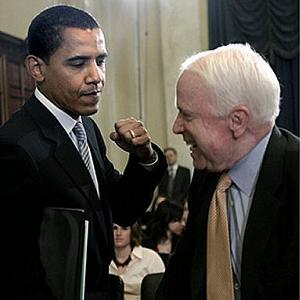 | | The honeymoon seems to be over |
One of the biggest issues in this year’s presidential election is energy policy, which has been in the news quite a bit these last few days. With a bill to “allow” offshore drilling passing through Congress and with the nerve-racking financial insanity going on in Wall Street putting the price of crude oil at over 120 bucks a barrel (as of the close of business Monday), the concepts of energy are among the first topics discussed by political analysts and news reporters today. This is hardly new, however, as the rising cost of energy, concerns over global warming, uneasiness over our dependence on foreign oil, and the ridiculous amounts of money we’re all paying at the pump have been top headlines for the whole duration of this election season.
Both candidates certainly have plans to do something about the energy situation in America today, but will their plans be successful, or will they lead to further economic collapse? I am incredibly wary of any presidential candidate who makes promises to fix the energy situation, as a president who is actually able to make the situation better is a rare creature indeed. Remember this: every single president since Jimmy Carter’s famous 1979 proclamation that foreign oil dependence would be “stopped dead in its tracks” (yes, every president, irrespective of party affiliation: Carter, Reagan, Bush #1, Clinton, and Bush #2) has promised to solve the energy crisis, and with every subsequent presidential administration, the problem gets worse rather than better. With that in mind, and with a skeptic’s view of any and all proposals, I’m prepared to examine the candidates.
Domestic Oil Production
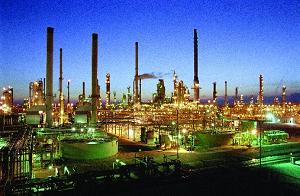 | | This installation--finished in 1976 in Garyville, La.--was the last oil refinery built in America |
America only produces somewhere between 33 and 48 percent of its own oil, depending on who’s numbers you look at. This is definitely a problem, as oil can not only be used as a bargaining chip by other nations but also because we have very little control over the price of it. Democrats and environmentalists are, for the most part, against increased oil production here in the states, either in the offshore* or Alaskan variety, due to environmental and political concerns. Still, even if we start drilling in ANWR, the Gulf of Mexico, and anywhere else where we might find a good supply, we wouldn’t be able to refine it, as oil refineries are closing down year after year and the United States of America hasn’t built a new refinery since 1976, again due to environmental and political concerns.
* As for the bill passed by the House of Representatives last week, it was a pure political maneuver. The bill, which is being touted by the press as an allowance for offshore drilling, is actually a strict ban on any drilling done within 50 miles of the coastline, which is where most of the oil is purported to be. It is a bill designed so that Democrats who are against offshore drilling can say they voted to allow it while pointing the finger at Republicans for voting against it, since the bill does allow drilling past the 50 mile mark, where there is little oil to be found and where it is prohibitively expensive to drill in any case. In other words, don’t be fooled by this bill; it is more problem than solution.
If we in the States want to rely so heavily on oil—a necessity that would take multiple decades to turn around—we need to be responsible enough to pay for it on our own. We may not like the idea of drilling in our own backyard or building a pollution-spilling refinery across the street, but I promise you that, with modern technology and the force of American capitalism behind it, our own drilling and refining would be far more controlled and do far less damage to the environment than the drilling and refining done by other nations. My ideal candidate would be one who recognizes this simple fact and would support not only increased oil production here at home, but also the building of newer and cleaner refineries across the country.
However, I would hope that the candidate would not assume this to be the only solution to the problem, as it is only one piece of the puzzle; even the biggest increase in drilling and refining possible wouldn’t end our reliance on foreign oil or fully address the environmental concerns posed by oil. Still, this does not mean that it is a bad idea; it will take multiple solutions to solve the energy crisis, not just the cherry-picked solutions that are friendly to a particular political ideology. This is why every administration since Carter has failed to solve the energy crisis, because partisan politics has always prevented us from using every solution available to us.
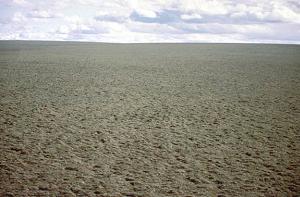 | | The coastal plains of the ANWR nature preserve |
John McCain, who has been trying to run on a campaign of energy solutions for a year now, has stated multiple times that he wants to deal with the energy problem on every front imaginable, on both the supply and demand sides of the equation. When it comes to domestic oil production, he has called and voted for lowering restrictions on offshore drilling, though he has repeatedly voted against drilling in ANWR, a stance on which he claims to have changed his mind (a claim given weight by his choice of running mate). He has also voted to fund the completion of a new gas pipeline from Alaska. Early in his campaign, he made a few unrealistically high goals, including being free of all oil imports in as little as five years, but has more recently lowered those lofty expectations to more realistic levels. Still, while he has been something of a hawk when it comes to increased domestic oil production, he has said nothing about the lack of refineries.
Barack Obama, who has vocally criticized McCain’s platform of increased drilling as a “stop-gap measure,” has in the same breath vowed to “tap our natural gas reserves.” Like McCain, he has called for a completion of a new gas pipeline from Alaska and has made unrealistic goals about ending all oil imports in a few years (ten, in the case of Obama). However, Obama has wavered in his position on offshore drilling. A year ago, he was staunchly opposed to it, and as little as three months ago, he said, “If I thought there was any evidence at all that drilling could save people money who are struggling to fill up their gas tanks by this summer or the next few years, I would consider it, but it won’t.” A month and a half ago, however, Obama made it clear he wanted to lift restrictions on offshore drilling, going so far as to equating it to a lowering of gas prices, a connection he staunchly refuted for months. He has since made no efforts to explain the complete turn-around of his position.
Both candidates, I think, are using smoke and mirrors here, and neither is proposing any real solutions to the foreign oil problem. Drilling in as many places as possible is all well and good, but it’s a long-term solution that isn’t even a solution as long as we refuse to build new refineries, a reality neither candidate seems willing to acknowledge. McCain’s all-of-the-above approach to energy policy is a welcome stance, but his position on the domestic side of oil production seems lacking in detail and consistency. Obama, on the other hand, is even worse, as he goes through a pattern of mocking McCain’s position before summarily adopting it as his own a few months later. It’s shameful politics at its worst, and neither candidate gets my vote on the sole basis of domestic oil production.
Alternative and Nuclear Energy
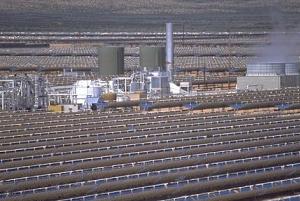 | | A solar power plant in India |
Another way to end our reliance on foreign oil and reduce the environmental fears posed by oil is to increase our usage of alternative energy. This is already starting, thanks to capitalistic forces, but the process is slow. Scientific advances in solar (seriously, solar; what we can now do with solar energy is a million times better than what we could do ten years ago, when it was first in vogue), wind, biofuel, tidal, clean coal, and many other types of alternative energy are setting the stage for a revolution in how America produces its energy. Still, even if we had perfect and cheap new technologies right now, it would take time to adjust the market and make way for a new paradigm. Tens of millions of people, at minimum, would be out of work if we completely stopped using oil tomorrow (not to mention the real havoc such a change would wreak on the backbone of American business and industry—several orders of magnitude more extreme than the relatively slight fluctuations going on right now), and newer technologies don’t necessarily make an equal amount of jobs or market forces. Additionally, we’d all have to buy new automobiles and new homes, a process that few of us can do overnight. Businesses would have to buy new trucks and planes to ship their products and new technologies for their buildings, which would spell bankruptcy for almost every company and corporation in the country, especially considering the fact that all these new automobiles, buildings, and technologies haven’t actually been designed or manufactured yet.
Still, there is the possibility of nuclear energy. Nuclear power plants may not be completely clean (they do produce nuclear waste), but they are far cheaper, cleaner, and more efficient than any other form of energy being used in large quantities today. In fact, they don’t emit a single molecule of greenhouse gas, meaning that anyone paranoid about manmade global warming should be completely on board. The main reason we don’t build more nuclear power plants, however, is environmental paranoia (and possibly terrorism concerns, but that seems a little silly to me). I’m sorry, but you can’t have it both ways, especially since modern technology makes nuclear power plants incredibly safe and efficient. Building new nuclear power plants would be faster than waiting for newer technologies, would see benefit a lot sooner and in larger quantities than increasing domestic oil production, and is safer for the environment than replacing every single American car with a hybrid.
All in all, my ideal candidate is a pioneer of every possible solution. Building nuclear power plants is a must, because it is the quickest and cleanest of all possible solutions, but it is still just the beginning. While I do not necessarily support increased government funding of alternative energies (which amounts to throwing taxpayer money away), I would support a candidate that talks about tax reductions and other benefits for companies that embrace alternative energy solutions. This process will happen without the help of our government, but an increase in incentive certainly couldn’t hurt. However, the candidate would have to be patient, because demanding that change come at any cost in as quick a form as possible would ruin our economy faster than you can say “Kyoto Protocol.”
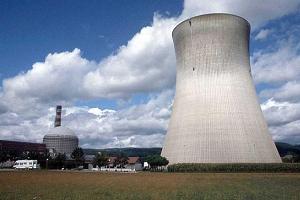 | | Nuclear power: clean, cheap, and endlessly renewable |
McCain has outlined a plan to bring 45 new nuclear power plants online by 2030, with a long term goal of creating at least 100 total. He supports going ahead with the Yucca Mountain plan for the time being, which will dispose of nuclear waste deep under the Nevada mountains, and he encourages the development of research into better ways of disposing of such waste in the future. In addition to supporting a large increase in nuclear power, McCain wants to implement a $5,000 tax credit to consumers who buy zero carbon emission automobiles, which would be an incentive for both consumers and manufacturers. He has several similar plans when it comes to finding new ways to power automobiles, with the long term goal of greatly reducing our dependence on foreign oil before it’s too late. He wants to spend $2 billion a year on research and development into clean coal technologies and offer substantial tax credits to companies working in any form of alternative energy research and development.
Barack Obama is not completely against the creation of nuclear power plants, but he hasn’t outlined a single plan to create them, offering only criticisms that there aren’t better ways to dispose of nuclear waste and strongly opposing the Yucca Mountain plan. He has also expressed reservations about the terrorist threat posed by more nuclear power plants. Obama is willing to spend $150 billion over ten years to fund new energy technologies, though the specifics behind that spending plan are unclear (except that he hopes it reduces our usage of oil by “as much as 35% or 40%”). He is against “token tax breaks” and tax credits given to companies and consumers, claiming that such tactics do not offer the proper incentive to develop alternative energy technologies. Obama also wants to increase emissions regulations, encourage efficiency standards for “lighting & appliances” (I’m not making that up), and offering money to the big automobile manufacturers as long as they invest in fuel-efficient cars.
McCain, though he wants to add an annual $2 billion to our spending budget, wins this round handily. Obama’s plans are murky, unclear, and are almost entirely based on throwing taxpayer money around, an exceedingly dangerous proposition considering all the other spending Obama wants to do and the current state of our economy. McCain has outlined specific plans, including his “Lexington Project,” that are designed to deal with the issue of alternative energy on multiple fronts, all without increasing governmental regulation or spending inordinate amounts of taxpayer money, whereas Obama has offered platitudes and vague promises with little explanation.
Global Warming
[NOTE: my view on this subject has changed significantly since the writing of this article]
Manmade global warming is most likely a myth, and if it is a reality, even the optimists say there’s no real solution. If you want my full opinion on the matter, I’ve made it clear elsewhere, and I’ve already discussed it when it comes to the candidates from a scientific standpoint. However, it should be brought up again, because both candidates have big proposals for dealing with the supposed problem, and it is in all our interests to examine how much damage these proposals will do. Needless to say, my ideal candidate would have no proposals at all when it comes to manmade global warming, because he or she wouldn’t even believe in it or would at least be cautious enough to know that kneejerk solutions at this stage of the game are unreasonable and dangerous, so my criteria for the winner on this issue is the one whose proposal will do the least amount of harm to our already fragile economy and whose proposed solutions to the energy crisis rely the least on those pointless and harmful proposals.
The Libertarian Perspective
Bob Barr hasn’t said much about energy policy, but what he has said is pretty extreme. He wants to end all government intrusion into the energy-based free market, meaning that the government will offer no incentives, punishments, or regulations. While this approach might just be crazy enough to work, it’s a little too risky for my tastes.
 I believe in the ideal here, but extreme ideological policy rarely works on the stage of reality. If this plan were implemented slowly and methodically—letting the training wheels off one at a time—I firmly believe it would eventually lead to a stable economy, and even if it is done immediately, Barr’s plan could very well be more effective than either McCain’s or Obama’s. Unfortunately, the risk of a truly epic failure and cataclysmic economic collapse is simply too damn high, making Bob Barr the reckless, though idealistic, candidate. I believe in the ideal here, but extreme ideological policy rarely works on the stage of reality. If this plan were implemented slowly and methodically—letting the training wheels off one at a time—I firmly believe it would eventually lead to a stable economy, and even if it is done immediately, Barr’s plan could very well be more effective than either McCain’s or Obama’s. Unfortunately, the risk of a truly epic failure and cataclysmic economic collapse is simply too damn high, making Bob Barr the reckless, though idealistic, candidate.
|
John McCain has outlined his mandatory “cap-and-trade” proposal, which he created with the help of Joseph Lieberman. In essence, this system gives government credits to companies that successfully reduce their carbon emissions, which they can then sell to other companies that aren’t reducing theirs. This system, while historically more effective than a simple carbon tax, does suffer from problems of enforcement, complexity, and unethical shortcuts that tend to do serious damage to local ecosystems. Also, practical applications of such emissions trading throughout the world today are met with mixed results.
Obama, on the other hand, wants to implement a mandatory “cap-and-trade” system. It is in effect the same as McCain’s plan, though Obama’s goals are a tiny bit loftier. Whereas McCain wants the system to plan a carbon emission reduction of 66% by 2050, Obama wants it to plan a reduction of 80% in that same span of time. Otherwise, the two plans are identical.
To be honest, I’m on the fence when it comes to emissions trading. I believe it to be more effective than a carbon tax or other bureaucratic rigmarole, but I also see how it can force the system to adjust too quickly and sloppily, leading to serious economic consequences. Still, regardless of how effective or dangerous a cap-and-trade system would be, both candidates are on equal footing here, as their plans are hard to tell apart. I don’t know if they win or lose this round, but either way, they’re in the same boat.
My Choice if Energy were the Only Relevant Issue
This has been a disappointing exercise this time around. Going into it, I thought both candidates had a stronger position when it came to energy policy, but beyond all the rhetoric and mudslinging, their ideas aren’t that revolutionary. Neither of them recognizes the need to build more oil refineries, and both of them are falling over themselves to implement cap-and-trade.
  |
| The Candidates and Energy |
  |
|
Still, I’ve got to give this one to McCain, but once again, it’s only by a thin margin. When it comes to domestic oil production, McCain is slightly stronger on the issue, though not nearly as strong as I want him to be, whereas Obama is overly critical of policy ideas he later adopts without much amendment. But on the issue of alternative energy, McCain is heads and tails ahead of Obama, because he has clear plans, is eager to build more nuclear power plants (the no-brainer option), and doesn’t want to throw a whopping $150 billion into the nebulous government machine like Obama does.
Unfortunately, however, even if McCain is elected, I don’t foresee an end to the energy crisis. The partisan problems that have plagued this issue for thirty years haven’t really gone away, though McCain puts on a good show of being a party maverick. Obama claims he wants to reach across the party line, but he only shows it by adopting the more liberal of McCain’s ideas (after criticizing them, of course) while promising to spend ludicrous amounts of money. Until we can finally get to a point where we are drilling in the right places, building our own oil refineries, producing vast amounts of alternative energy, and creating automobile technologies that don’t use a single drop of oil, this crisis will continue unabated, no matter how many Band-Aids the politicians apply and how many empty promises they make.
If you disagree with me (or even if you agree), feel free to add comments below. Otherwise, check back in three weeks when I’ll outline The Candidates and Foreign Policy.
-e. magill, 09/23/2008
|
|